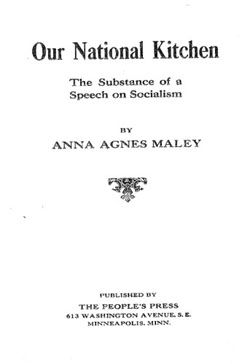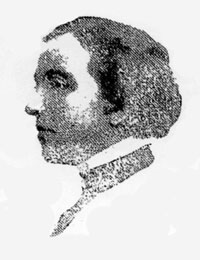
www.snohomishwomenslegacy.org WLP Story # 40 ~ |
|
ANNA AGNES MALEY (1872-1918) Everett’s First Woman Editor and Washington State Candidate for Governor by Margaret RiddleSocialist reformers in the early 1900s saw the Pacific Northwest as fertile ground for building communities anew based on their own idealistic principles. Utopian colonies such as Equality and Home were established in Washington State, and the national Socialist movement made an organized effort to win positions of leadership in western states. In 1897, the Brotherhood of the Co-operative Commonwealth met at a convention in Ruskin, Tennessee and openly suggested that the Socialist Party move quickly to capture the 1901 Washington State elections. Everett, Washington drew its share of reformers at this time, due in part to its socio-economic structure of industrialists and workers which gave ample cause for political debate. Organized labor formed a solid base in the community as early as the 1890s and in 1901 the trades union Labor Journal published its first issue. But socialism was alive in the city as well. Between 1911 and 1919, Everett was the base for a Socialist newspaper which operated through a succession of four different names. |
|
Anna Agnes Maley (1872 – 1918), an author, journalist and lecturer of national reputation, arrived in Everett in September of 1911 to become the third editor of the most successful of these papers, The Commonwealth, the official publication of the Washington State Socialist Party. The newspaper gave Maley an outlet for commentary and helped launch her political career. Contemporary journalists write of Anna as a forceful and persuasive speaker who quickly gained the support of the Washington State Socialist Party. Maley resigned as editor in the spring of 1912 to run as the Socialist Party candidate for governor. She was a moderate, and although she did not win, Maley received 37,155 votes, about 12 percent of those cast. Socialist presidential candidate Eugene Debs drew about the same number of votes, indicating that Socialists had voted a straight party ticket.
Maley’s roots were in the Midwest. Born in Faxon, Sibley County, Minnesota on January 6, 1872, Anna was educated in Minneapolis, working first as a stenographer and later as a teacher. She taught for six years in Minnesota schools and then studied literature at the University of Minnesota. It was here that she learned about socialism and the radical movement.

Maley’s journalism career began in Kansas in 1903, but the socialist cause soon took her to the east coast where she wrote for two publications, the New York Worker and the New York Call. During this time Maley met radical thinkers from around the world. Her interest and dedication to socialism led her to a position of leadership. She lectured throughout the country and acted as advisor in several large strikes. In 1909 she was chosen as chairwoman of the Woman’s National Committee of the Socialist Party, a group primarily dedicated to women’s issues. The party felt that Anna put the WNC on solid ground.
After Maley’s defeat in the race for Washington governor, she hoped to run for other state party positions but became a casualty of squabbling Socialist factions. A radical group was gaining prominence in state politics and Anna and the moderates were brushed aside, a split that contributed to the party’s decline. From articles that appear in the Commonwealth, Anna never drew much salary as an editor or writer and mostly made her living by speaking on the Lyceum circuit. In 1915 she was a teacher at the Rand School of Social Science in New York City. During this time she wrote a pamphlet called “Our National Kitchen: the Substance of a Speech on Socialism.” Appealing to women for support, she compared industry to household management:
“A woman does not feel quite at home in discussing politics. She has had but little share in politics. She is not supposed to know much about them. Her ignorance is surely excusable since she has had nowhere to learn politics except in bad preachments and the worse practices of her brothers.”….. “Industry is, after all, no more and no less than our national housekeeping. It is the process of feeding, clothing, housing and educating our people.”
By now over 40 years of age, Anna Maley married for the first time. While traveling through the southern states, her husband contracted malaria and soon died. For the remaining years of her life, Anna was in poor health and was cared for by her family in Minnesota. In November of 1918, Maley died at her sister’s home. A large funeral procession of family, friends, and union workers accompanied her body to its final resting place in St. Mary’s cemetery, Minneapolis.
Sources:
Mari Jo Buhle, Women in American Socialism (Urbana and
Chicago, University of Illinois Press, 1981), 153;
Minneapolis Morning Tribune, November 25, 1918, p.9;
Minneapolis Journal, November 25, 1918;
The Commonwealth, Everett, Washington, 1911-1912;
Frederick Bird, “The Labor Press Project”, web accessed
January 2007
http://faculty.washington.edu/gregoryj/laborpress/;
(“The Story of The Washington Socialist and The Old
Commonwealth,” by F. G. Crosby, published in the Feb. 4,
1915 edition of the Washington Socialist)
Anna Maley, “Our National Kitchen: the Substance of a Speech
on Socialism” Pamphlet
